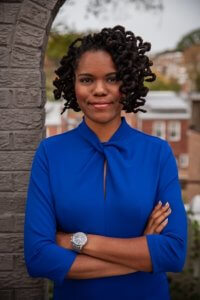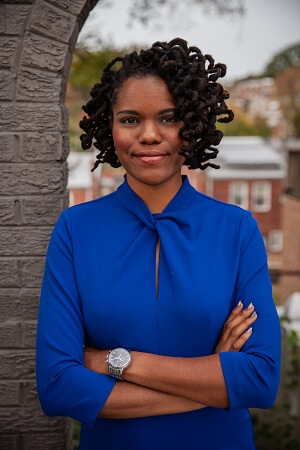An Interview With Jeanné L. Lewis, VP and Chief Engagement Officer, National Committee for Responsive Philanthropy (NCRP)
In this interview, Jeanné L. Lewis reveals a snippet of the playlist that fuels her, why it’s problematic that the social sector conflates leadership with authority, and why it’s her responsibility to be vigilant about her boundaries and capacity.
I curate empowered communities.
Twitter and Facebook: @msjeannelewis
Tell me about your current role?
I am one of three vice presidents. In 2016, the National Committee for Responsive Philanthropy (NCRP) developed a new strategic  framework which resulted in investing more in engagement work. I lead the team focused on securing behavior change among foundations and supporting empowerment of nonprofits with their engagement with foundations. The work entails fundraising, a nonprofit membership program, securing commitments from funders, webinars and conference presentations, developing a field presence and one on one engagement with targeted foundations we want to influence. As a member of the senior leadership team, I advise the CEO and help make leadership decisions.
framework which resulted in investing more in engagement work. I lead the team focused on securing behavior change among foundations and supporting empowerment of nonprofits with their engagement with foundations. The work entails fundraising, a nonprofit membership program, securing commitments from funders, webinars and conference presentations, developing a field presence and one on one engagement with targeted foundations we want to influence. As a member of the senior leadership team, I advise the CEO and help make leadership decisions.
Is your team responsible for Power Moves? I’m such a fan of that tool.
All our projects and initiatives have a research, communications and engagement component. I am a senior advisor for the Power Moves team; this phase with the tool is heavily focused on engagement. We have a priority list of foundations that have downloaded the tool, using it at various levels, and we are deeply engaging those foundations to help move them along the spectrum of behavior change. But more than 3,000 people have downloaded the tool since inception. We’ve identified best practice examples and are putting them on the website, and tracking engagement with the tool for overall evaluation.
If there was a soundtrack of greatest hits related to your career, what songs would make the list?
I love this question. I am a singer and sing in SongRise, a women’s social justice a cappella group. We cover songs by Sweet Honey in the Rock like “Ella’s Song,” “A Change is Gonna’ Come” by Sam Cooke, and “Rise Up” by Andra Day. I’m a big fan of Lupe Fiasco’s “Form Follows Function.”
I’m part of racial equity group and we made a liberation playlist which includes “Redemption Song” by Bob Marley. Anything by Nina Simone. “Great Work” by Brian Courtney Wilson.
These songs are a short sample of a very long list of music that I adore, as they are calling us into a place of vision and not being satisfied with current conditions as they are but imagining a world in which we are deeply thriving. This is important to me because while I am pragmatic and recognize that we have some urgent needs to address right now, I actually think one of the most disempowering conditions is having convinced so many marginalized people, Black people, and women that we expect too much. It’s about balance. In my leadership roles, I must consider a lot of factors. I temper asking, “Why not?” with pragmatism. I raise questions about how we keep people together as we move forward. These songs taught me how to hold a vision while navigating problems and obstacles that are right in front of me.
Work in the social sector can be very personal and linked to one’s values. Can you think of a time when your values were in tension and how you reconciled that tension or not?
I started my career as a community organizer right after college. After that I did restorative justice work with youth; basically, I was working in left-leaning social justice circles. Then I married a soldier during the Iraq-Afghanistan War, and we lived in a military town in North Carolina. It was tricky because the culture of the military especially during wartime is very different from places I had worked and lived. I wouldn’t say that ultimately values were in conflict, but it felt that way at the time. I have realized that people shared many of the same values that I did but had different ideas about how to solve problems.
As I’ve grown in my career, I have observed that is more often the case than having a different set of values. It’s hard to convince people of that. When we are in the fray, we believe people are our enemies trying to set us back and resisting us fundamentally. In the case of white supremacy and other hate-based philosophies that is true, but in many of my experiences, a lot of times what is really going on is a drastic difference in opinion about how to solve the problem. As leaders it’s important to discern when that is the case versus someone acting toward our destruction. That difference in motive demands different responses.
Can you share an experience in the workplace where you have had to reclaim your time? What was the context? How did you navigate it?
I’m reclaiming my time all the time, though not as aggressively as Maxine Waters had to do it thankfully. Generally, I find my workplace to be supportive; however, we all have blind spots and get lost in our own positions. Recently we had a lot of vacancies on staff and shifted roles and responsibilities and in doing that, the senior leadership team and I had to fill in the gaps because we saw changes coming before others. I realized that others had been depending on me for things that weren’t really my responsibility. I couldn’t do it during this transition because I didn’t have bandwidth. We have good relationships on the senior leadership team, so I communicated that some things needed to shift, and we figured out a different way to relate to each other and balance the work.
I started by saying I’m reclaiming my time all the time. I’ve learned over the course of my career that people will make a lot of asks of me, and it’s my responsibility to be vigilant about my boundaries and capacity. Otherwise I find myself carrying emotional and other burdens I don’t need to carry.
What’s your approach to self-care? Are there any rituals you use to survive and thrive?
I love rituals. I pray every day in the morning and for me that is critical. I read scripture every day, reflect and meditate. I’m intentional about my diet but not rigid about it because for me food and drink are also very social. It’s more important to me that I can socialize with people over food and drink. I invest in things that make me feel good. I sing and love music. I have different playlists for different moods. I usually listen throughout the day and use music to shift my mood and state of mind to fully show up in whatever I am doing.
I have a coach whose first assignment was for me to put images of women in my line of sight where I would see them every day. I have a visual in my office to remind me of the leadership qualities and strengths of those women and to apply them to my own life.
We come from a resilient and strong lineage. How would you describe the type of ancestor you want to be and why?
Values important to me are empowerment, honesty and acknowledgement. The kind of ancestor that I want to be is someone who was empowered, courageous, faced her fears, challenged herself, and was constantly learning throughout her life.
I want to be known as a truth teller but someone who tells the truth in love. I’m not a fan of the clap back. I can do it but prefer to strengthen relationships when I can instead of ripping them apart. To move into right relationship with others requires honesty and not giving into the temptation of demeaning others even if they are doing that to me. Sometimes a respectful, honest relationship isn’t possible, but it’s the goal. Acknowledgement means I want people who encounter me to feel like I saw them even if for a moment. We all need to feel seen and acknowledged as human beings with dignity and respect.
What advice would you offer other Black women trying to develop or amplify their voice and become better self-advocates?
Spend lot of time getting to know yourself. Really look at yourself in the mirror. Face your fears and be honest with yourself. That doesn’t mean to put ourselves down, but to tell the truth. Once you’re able to accept truth from yourself, you can stand confidently. People can’t call you out since you already had the conversation with yourself. When we are more rooted, we are more confident about moving in the world and less shaken by others’ thoughts of who or what we should be.
My coach talks about this as well. Particularly as women, we have to recognize that the internal work is important work which requires significant strength and that development doesn’t always have to be externalized. Our society values loud voices, shiny objects, marketing and media strategies, but there are women who seem to be in the background making profound change from the core of their inner strength. Developing inner strength is equally important to refining our social media presence or developing our personal brand.
If you could change the social sector in a way that would benefit or affirm Black women, what would that change be?
It’s about expanding our definition of what leadership means. In the social sector, and other sectors, we conflate leadership and authority. For me authority means position, you know, the power to make decisions and the rules. That’s important and we need Black women in authority, but leadership is different and not dependent on position. Leadership can be exercised by anyone who can convince others to follow.
The social sector conflates those two things and fails to recognize leaders because we assume that only those in authority can lead. If the social sector depended less on positions of authority and expanded structures to invite leadership on an ongoing basis, it could be deeply transformative.



Comment section